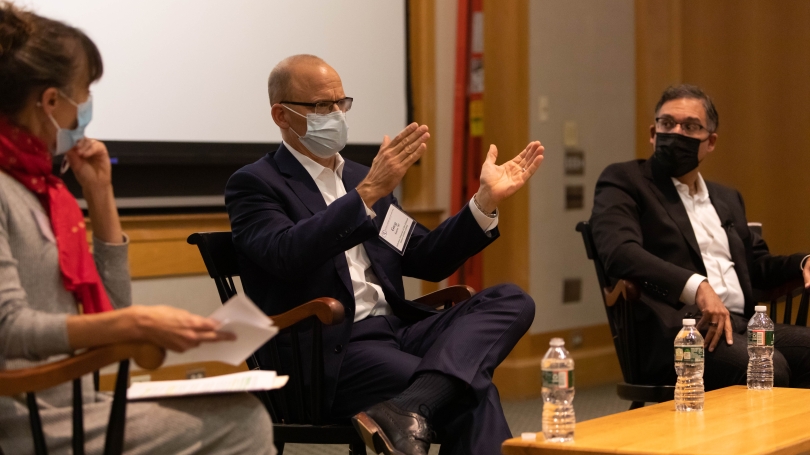
- Public Policy
- Leadership
- Funding
- News & Events
- About the Center
Back to Top Nav
Back to Top Nav
Back to Top Nav
Back to Top Nav
On October 21, 2021, the Rockefeller Center, the Warren B. Rudman Center at the UNH Franklin Pierce School of Law, and the New Hampshire Institute for Civics Education co-hosted a conversation with Greg Garre '87 and Neal Katyal '91 titled "Renewing Trust in Democracy: the Role of Courts." Moderated by Laura Knoy, former host of NHPR's "The Exchange," their discussion centered around the role of the Supreme Court in maintaining a balanced democracy, the threats the Supreme Court of the United States (SCOTUS) faces in maintaining this role, and how Garre and Katyal's own extensive experience as advocates have informed their own understanding of the Court's critical work.
From controversial nominations of prospective justices to the recent contention of historic cases that are well-known to the public, the Supreme Court has amassed a great deal of attention from politicians, pundits, and the public in recent years. Keeping these developments in mind, "it is the case that the trust levels of the Supreme Court have gone down recently quite starkly," Katyal explained. Garre agreed, noting that in addition to a decline in public trust, "the Court is facing an unprecedented backlash from other branches" based on the discourse surrounding the controversial confirmation hearings of Justices Amy Coney Barrett and Brett Kavanaugh.
Where does the Supreme Court's role fit into all of this? Though it is the "the crown jewel in our kind of constitutional democracy," Katyal argued, the reputation of the Court is put into question and "corroded" when pundits and politicians began to arbitrarily question its nonpartisanship. At the same time, Katyal believes that the Court has the potential to be a great model for civics; contrary to popular belief, justices are not asking political questions, but are rather listening "dispassionately and even-handedly" to discern the best argument from the ones which they are presented. Amidst the current sense of political polarization, it's good that justices are "coming together and conversing," Garre explained, adding that "it's really critical for the nation to be able to respect [the rulings]" of the Court.
Garre also believes that the increased public spotlight on the Supreme Court in general makes it harder to do their everyday jobs. Recounting the walks he'd take with then-Chief Justice Rehnquist outside the Court's building, Garre described times when tourists would come up to Rehnquist – unaware of whom they were speaking to –and ask him to take their photo, explaining that today's members of the Court would not be able to exercise such freedoms.
Garre and Katyal also commented on some of the ways in which the Supreme Court can expand upon its powers to address certain criticisms. Katyal strongly believes that as part of its potential to encourage civic engagement, the Court should hold televised hearings. "I think it's virtually criminal that … very few of you will get to see a Supreme Court argument in your lifetimes," he emphasized.
Meanwhile, Garre addressed the increasingly popular notion that the Congress could increase the number of seats on the Court from the current nine. While he explained that it was technically possible, Garre described it as a "race to the bottom," warning that each political party could easily use a Court expansion as a means of retaliation as Congress shifts hands every few years. In allowing this, he argued, "you're telling everybody that the only thing that matters is which political parties puts the justices in place and that, you know, those parties will expect the justices to vote their way."
As seasoned advocates—between the two of them they've argued nearly 100 cases in front of the Court—Garre and Katyal also discussed the ways in which they prepared for presenting in front of justices. For Garre, making the most of an argument simply comes down to paying attention to the questions and answering them as carefully as possible. "Oftentimes you're so wrapped up in preparing for oral argument that you've sort of thought through the questions and thought through the answer" already, and as a result neglect any additional nuance a justice may include when actually presenting their question, Garre explained. At the same time, it is also important to "give" a little bit to the opposing argument; that is, Garre said, when confronted with the other side's views, acknowledge their merit but then give a strong rebuttal in response.
Similarly, Katyal added, as an advocate, it is critical to use the questions justices ask each other as an opportunity to further your own argument. "As the advocate…you're more of an interlocutor," he said; if you understand that "the question to you is actually really a point to one of their colleagues, then it's more like you're facilitating a conversation and less like you're actually arguing at the podium."
As for current students who are interested in government and the law, Katyal expressed discontent with the increasing sentiment among young lawyers that it's difficult to enter nonpartisan legal jobs in government if they don't agree politically with the administration in office. "I would hate for someone not to go to law school because they see political partisanship in our society," he said; "the training in the law is a training in logic and respect for argument" that can broaden one's understanding of the law, civics, and role of legal institutions in society.
-- Written by Shawdi Mehrvarzan'22, Rockefeller Center Student Program Assistant for Public Programs